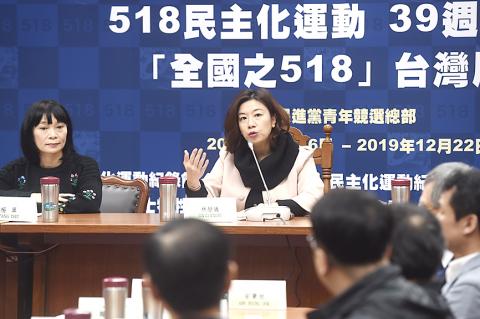An exhibition commemorating South Korea’s Gwangju Uprising opened in Taipei yesterday.
To mark the 39th anniversary of the South Korean pro-democracy movement, as well as the 40th anniversary of Taiwan’s Kaohsiung Incident, the Transitional Justice Commission invited organizers of the Gwangiu exhibition to present it in Taiwan, Democratic Progressive Party (DPP) Legislator Lin Ching-yi (林靜儀) told a news conference.
The Kaohsiung Incident, also known as the Formosa Incident, took place on Dec. 10, 1979, when a demonstration organized by opposition politicians and Formosa Magazine to commemorate Human Rights Day turned violent.

Photo: Chien Jung-fong, Taipei Times
Members of the crowd unknown to the organizers — and widely believed to have been agents provocateurs — began attacking police, which was followed by the then-Chinese Nationalist Party (KMT) government arresting and jailing a group of political dissidents.
The Gwangju Uprising — also called the May 18 Democratic Uprising — against martial law took place in Gwangju, South Korea, in 1980.
More than 200 people died or went missing, official figures showed, while advocates have said that the toll might have been three times higher.
Commission Acting Chairwoman Yang Tsui (楊翠) said that the agency saw the exhibition held by the South Korean National Assembly during a visit in June and was inspired by its efforts in exhibiting historical wounds to create an opportunity for forgiveness and reconciliation.
The exhibition demonstrated how to implement transitional justice at the right pace, she added.
Victims of the uprising have witnessed public apologies by the South Korean government, DPP legislator-at-large nominee Fan Yun (范雲) said, adding that several movies documenting the democratic process and independent reports about the female victims in the uprising have been made.
On the other hand, Taiwan does not have any movie dedicated to the Kaohsiung Incident, let alone independent investigation reports about female victims, she said.
Nor has anyone apologized for the incident and transitional justice has not been achieved, as it remains unanswered who should be held accountable for turning the peaceful protest into a violent uprising, she added.
May 18 Archives researcher Lee Deok-jae said that after martial law was imposed in South Korea, soldiers entered Gwangju and began massacring people.
The uprising gave rise to the pro-democracy movement in South Korea, as its ripple effects spread not only within Gwangju, but across the nation, Lee said.
The 228 Massacre in Taiwan must have been similar, he added.
The 228 Massacre refers to an uprising that was ignited on Feb. 27, 1947, against the then-KMT regime and a resulting crackdown that left tens of thousands of people dead and launched the White Terror era.
May 18 Memorial Foundation Education Culture and Department manager Gwon Hyeok-min said that she was in Gwangju when the uprising started, which was why she can sympathize with victims of the 228 Incident and the Kaohsiung Incident, as she understood how it felt to be called a “rioter.”
Taiwan’s 40-year-long government oppression during the Martial Law era can have devastating effects on the mental health of its victims, Gwon said, expressing the hope that efforts to implement transitional justice could heal the trauma.
The exhibition runs until Dec. 22 at an open space across from the National Audit Office on Taipei’s Hangzhou N Road. Admission is free.

Alain Robert, known as the "French Spider-Man," praised Alex Honnold as exceptionally well-prepared after the US climber completed a free solo ascent of Taipei 101 yesterday. Robert said Honnold's ascent of the 508m-tall skyscraper in just more than one-and-a-half hours without using safety ropes or equipment was a remarkable achievement. "This is my life," he said in an interview conducted in French, adding that he liked the feeling of being "on the edge of danger." The 63-year-old Frenchman climbed Taipei 101 using ropes in December 2004, taking about four hours to reach the top. On a one-to-10 scale of difficulty, Robert said Taipei 101

A preclearance service to facilitate entry for people traveling to select airports in Japan would be available from Thursday next week to Feb. 25 at Taiwan Taoyuan International Airport, Taoyuan International Airport Corp (TIAC) said on Tuesday. The service was first made available to Taiwanese travelers throughout the winter vacation of 2024 and during the Lunar New Year holiday. In addition to flights to the Japanese cities of Hakodate, Asahikawa, Akita, Sendai, Niigata, Okayama, Takamatsu, Kumamoto and Kagoshima, the service would be available to travelers to Kobe and Oita. The service can be accessed by passengers of 15 flight routes operated by

Taiwanese and US defense groups are collaborating to introduce deployable, semi-autonomous manufacturing systems for drones and components in a boost to the nation’s supply chain resilience. Taiwan’s G-Tech Optroelectronics Corp subsidiary GTOC and the US’ Aerkomm Inc on Friday announced an agreement with fellow US-based Firestorm Lab to adopt the latter’s xCell, a technology featuring 3D printers fitted in 6.1m container units. The systems enable aerial platforms and parts to be produced in high volumes from dispersed nodes capable of rapid redeployment, to minimize the risk of enemy strikes and to meet field requirements, they said. Firestorm chief technology officer Ian Muceus said

MORE FALL: An investigation into one of Xi’s key cronies, part of a broader ‘anti-corruption’ drive, indicates that he might have a deep distrust in the military, an expert said China’s latest military purge underscores systemic risks in its shift from collective leadership to sole rule under Chinese President Xi Jinping (習近平), and could disrupt its chain of command and military capabilities, a national security official said yesterday. If decisionmaking within the Chinese Communist Party has become “irrational” under one-man rule, the Taiwan Strait and the regional situation must be approached with extreme caution, given unforeseen risks, they added. The anonymous official made the remarks as China’s Central Military Commission Vice Chairman Zhang Youxia (張又俠) and Joint Staff Department Chief of Staff Liu Zhenli (劉振立) were reportedly being investigated for suspected “serious